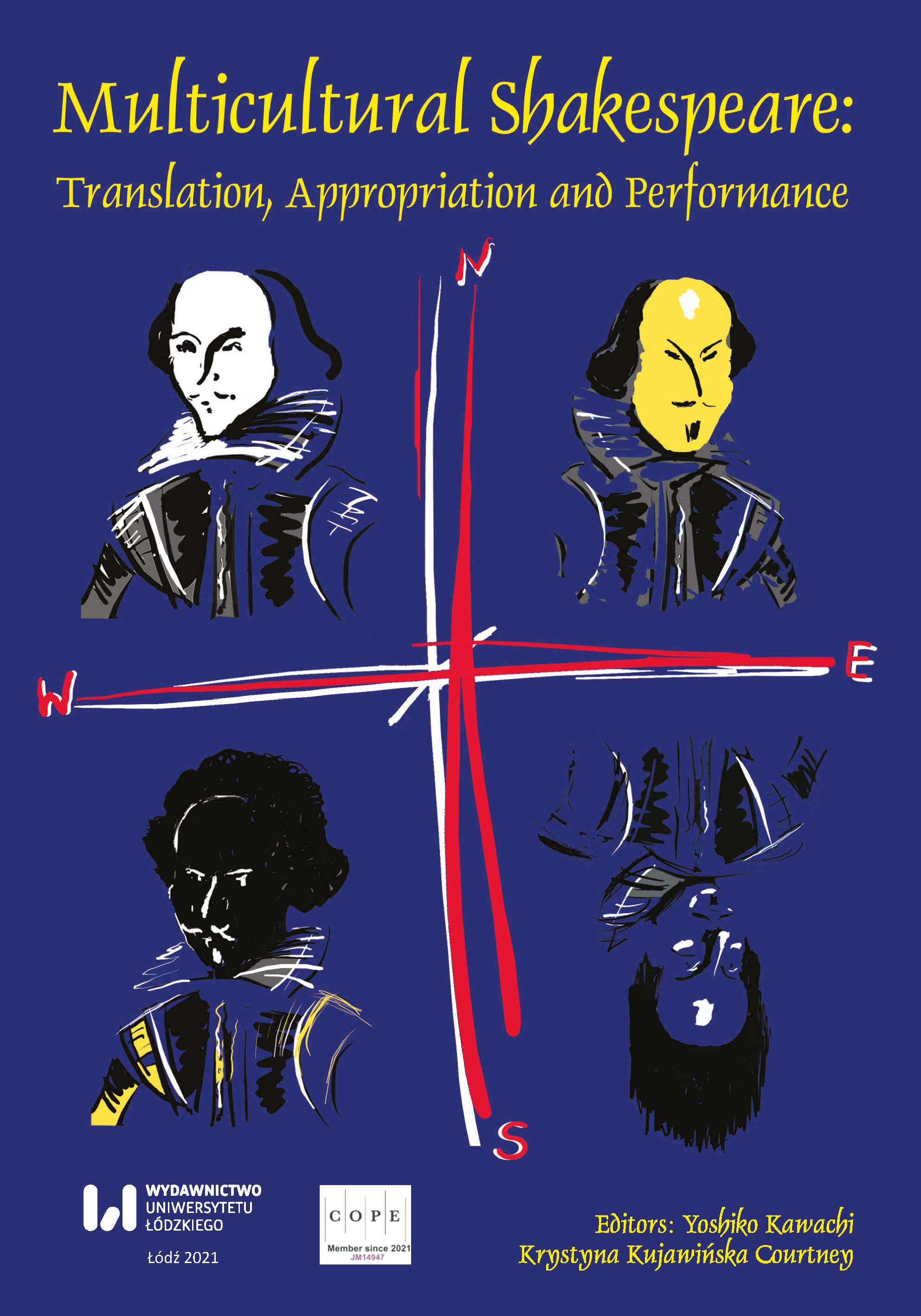Crossings with Jatra: Bengali Folk-theatre Elements in a Transcultural Representation of Lady Macbeth
DOI:
https://doi.org/10.18778/2083-8530.23.06Keywords:
Jatra, Lady Macbeth, Vaishnavism, Shakespeare adaptations, Crossings by Vikram IyengerAbstract
This paper examines a transcultural dance-theatre focusing on Lady Macbeth, through the lens of eastern Indian Bengali folk-theatre tradition, jatra. The wide range of experimentation with Shakespeare notwithstanding, the idea of an all-female representation is often considered a travesty. Only a few such explorations have earned recognition in contemporary times. One such is the Indian theatre-dance production Crossings: Exploring the facets of Lady Macbeth by Vikram Iyenger, first performed in 2004. Four women representing four facets of Lady Macbeth explore the layered nuances that constitute her through the medium of Indian classical dance and music juxtaposed with Shakespearean dialogues from Macbeth. This paper will argue the possibilities posited by this transgressive re-reading of a major Shakespearean tragedy by concentrating on a possible understanding through a Hindu religious sect —Vaishnavism, as embodied through the medium of jatra. To form a radically new stage narrative in order to bring into focus the dilemma and claustrophobia of Lady Macbeth is perhaps the beginning of a new generation of Shakespeare explorations. Iyenger’s production not only dramatizes the tragedy of Lady Macbeth through folk dramatic tradition, dance and music, but also Indianises it with associations drawn from Indian mythological women like Putana (demoness) and Shakti (sacred feminine).
Downloads
References
“Binodini Dasi”. Women Writing in India. Volume I: 600 B.C. to the Early Twentieth Century. The Feminist Press. Ed. Susie J. and K. Lalita Tharu. New York: The Feminist Press, 1991: 290-296.
Google Scholar
Bhaktivedanta, Swami Prabhupada. The Original Teachings of His Divine Grace A.C. Bhaktivedanta Swami Prabhupada. n.d. 21 Dec 2020. https://prabhupadabooks.com/cc/madhya/6/163?d=1 https://prabhupadabooks.com/cc/madhya/20/108-109
Google Scholar
Biography of Sri Ramakrishna. n.d. 10 Dec 2020. https://www.publishyourarticles.net/knowledge-hub/biography/biography-of-sri-ramakrishna/3950/
Google Scholar
Carroll. William C., “The Fiendlike Queen: Recuperating Lady Macbeth in Contemporary Adaptations of Macbeth,” Borrowers and Lenders: The Journal of Shakespeare and Appropriation 8.2 (2014). http://www.borrowers.uga.edu/
Google Scholar
Chakravarti, Paromita and Swati Ganguly. “‘Dancing like a Man’: The Politics of gender and cultural hybridity in Crossings.” n.d. 1 March 2019.
Google Scholar
Crossings: Facets of Lady Macbeth. Dir. Vikram Iyenger. Perf. Anubha and Dana Roy, Debashree Bhattacharya et al. Fatehpuria. Gyan Mancha, Kolkata. 2016.
Google Scholar
Dasgupta, Surendranath. History of Indian Philosophy. Vol. 1. Cambridge: Cambridge University Press, 1922.
Google Scholar
Dey, Naina. “Utpal Dutt and Macbeth Translated.” In Performing Shakespeare in India: Exploring Indianness, Literatures and Cultures. Ed. Panja, Shormishtha and Babli Moitra Saraf. New Delhi: Sage Publications India, 2016.
Google Scholar
Dharwadker, Aparna Bhargava. Theatres of Independence: Drama, Theory, and Urban Performance in India since 1947: Studies in Theatre History and Culture. Iowa: University of Iowa Press, 2005.
Google Scholar
Eliot, Thomas Stearns. “The Waste Land.” 1922. POETRY FOUNDATION. 15 Dec 2020. https://www.poetryfoundation.org/poems/47311/the-waste-land
Google Scholar
Goswami, Srila Sukadeva. “Deliverance of Putana.” Nityaà Bhägavata-Sevayä 43 (2016). 15 Dec 2020. https://books.google.co.in/books?id=jvThDAAAQBAJ&printsec=frontcover&source=gbs_ge_summary_r&cad=0#v=onepage&q&f=false
Google Scholar
Hansen, Kathryn. “Indian Folk Traditions and the Modern Theatre.” Asian Folklore Studies 42.1 (1983). 23 Dec 2020. https://www.jstor.org/stable/1178367
Google Scholar
DOI: https://doi.org/10.2307/1178367
Kapoor, O.B.L. The Philosophy and Religion of Sri Caitanya: The Philosophical Background of the Hare Krishna Movement. New Delhi: Munshilal Manoharlal Publishers Pvt. Ltd., 1976.
Google Scholar
Kennedy, Melville T. The Chaitanya movement : A Study of the Vaishṇavism of Bengal. Calcutta: Association Press, 1925.
Google Scholar
Massey, Reginald. India’s Dances: Their History, Technique, and Repertoire. New Delhi, 2004.
Google Scholar
Muni, Bharata. The Natyasastra. Trans. Manomohan Ghosh. Calcutta: Asiatic Society of Bengal, 1951.
Google Scholar
O’Flaherty, Wendy Doniger. Women, Androgynes, and Other Mythological Beasts. Chicago: The University of Chicago Press, 1980.
Google Scholar
Panja, Shormishtha and Babli Moitra Saraf. Performing Shakespeare in India: Exploring Indianness, Literatures and Cultures. New Delhi: Sage India Publications, 2016.
Google Scholar
Saha, Sharmistha. Theatre and National Identity in Colonial India: Formation of a Community through Cultural Practice. Singapore: Springer, 2018.
Google Scholar
DOI: https://doi.org/10.1007/978-981-13-1177-2
Sarkar, Pabitra. “Jatra: The Popular Traditional Theatre Of Bengal.” Journal of South Asian Literature 10.2/4 (1975). 23 Dec 2020. https://www.jstor.org/stable/40871932
Google Scholar
Schwartz, Susan. Rasa: Performing the Divine in India. New York: Columbia University Press, 2004.
Google Scholar
Sen, Rai Bahadur Dinesh Chandra. Chaitanya and His Age: Ramtanu Lahiri Fellowship Lectures. Calcutta: University of Calcutta, 1922.
Google Scholar
Shakespeare, William. Macbeth. Ed. Sandra Clark and Pamela Mason. London: Bloomsbury Arden Shakespeare, 2015. (All quotations from Macbeth are from this edition.)
Google Scholar
Trivedi, Poonam. “‘Folk Shakespeare’: The Performane of Shakespeare in Traditional Indian Theatre Forms.” In India’s Shakespeare: Translation, Interpretation, and Performance. Ed. Poonam Trivedi and Dennis Bartholomeusz. University of Delaware Press, 2006.
Google Scholar
Trivedi, Poonam. “Garrison Theatre in Colonial India: Issues of Valuation.” In Theatre History and Historiography: Ethics, Evidence and Truth. Ed. Claire and Jo Robinson Cochrane. New York: Palgrave Macmillan, 2016.
Google Scholar
Williams, Monier. “Nritya”. Sanskrit English Dictionary. Oxford University Press, 1899.
Google Scholar
Downloads
Published
How to Cite
Issue
Section
License

This work is licensed under a Creative Commons Attribution-NonCommercial-NoDerivatives 4.0 International License.












